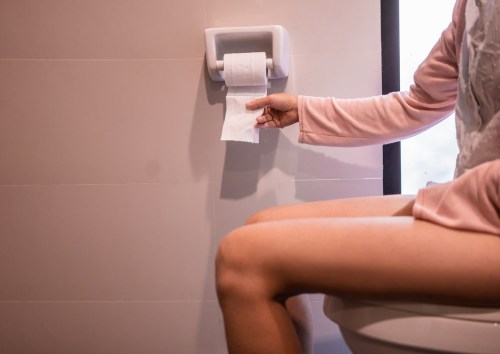‘I’m a Urologist, and This Is Why You Need To Stop Power Peeing’
Power peeing, or forcing out urine, is anything but beneficial for the long-term health of your bladder, according to a urologist.

Let’s get up close and personal for a minute. Have you ever had to pee but when you sit down to actually go, it’s doesn’t happen as quickly as you’d like? Maybe you’re in a rush and just wish things would speed up or perhaps you feel like there’s a little left and you might as well try to push it out. Whatever the case may be, Robert Mordkin, MD, FACS, chief of urology and the director of robotic and laparoscopic surgery at the Virginia Hospital Center in Arlington, Virginia, says to do your very best to remain patient while peeing. After all, power peeing (yes, it has a name) is anything but beneficial for the long-term health of your bladder.
Experts in This Article
chief of urology and director of robotic and laparoscopic surgery at the Virginia Hospital Center
“The term ‘power peeing’ generally means that a person is trying to urinate stronger, faster, and more forcibly,” says Dr. Mordkin, who is also the chief medical officer at LetsGetChecked. While it can happen anytime someone is forcibly trying to push out their pee, he says that it’s also especially common with folks who opt for squatting and hovering over sitting, as doing so can require extra effort to urinate.
From a very scientific standpoint, Dr. Mordkin explains: “Our bodies have, over the millennia, evolved a highly sophisticated system for proper elimination of urine. This involves a complex neurological pathway that triggers the contraction of the bladder muscle with a coordinated relaxation of the urinary sphincter. Repetitive power peeing can disrupt this synchronized event and, over time, lead to a loss of bladder strength and proper sensation, culminating in poor emptying and the inability to appropriately discharge urine.”
In other words, while power peeing might help you get out of the bathroom quicker while you’re in a crunch, it can actually lead to some pretty time-consuming consequences and induce self-consciousness down the road.
“The straining and squatting required for power peeing will create undo stress to a woman’s musculature, including the important structures of the pelvic floor,” says Dr. Mordkin. “This includes the muscles and ligaments associated with the vagina and uterus.” In advanced (severe and rare) cases, he says that power peeing can lead to bladder, uterus, and/or rectum prolapse through the vagina.
Now, while many cases of power peeing are to speed things up in the restroom, Dr. Mordkin recognizes that some folks physically feel as though they have to push to pee.
“If a person finds that they have to ‘push’ or strain to normally urinate, or if they have a sensation of incomplete bladder emptying, they may have an underlying problem with their bladder,” he says. “This can include obstruction of their urinary tract or an underlying infection or neurological disease.” In either case, he says that if you’re noticing any of these symptoms or sensations, you should schedule an appointment with a urologist sooner rather than later.
Oh hi! You look like someone who loves free workouts, discounts for cutting-edge wellness brands, and exclusive Well+Good content. Sign up for Well+, our online community of wellness insiders, and unlock your rewards instantly.
Sign Up for Our Daily Newsletter
Get all the latest in wellness, trends, food, fitness, beauty, and more delivered right to your inbox.
Got it, you've been added to our email list.










